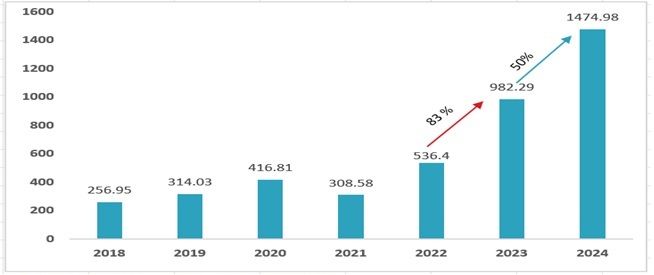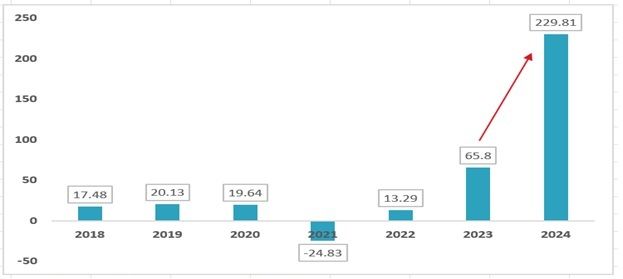
Ratan Tata made one of his most significant contributions to the Indian fashion industry through Trent Limited, the retail arm of the Tata Group. Under his visionary leadership, Trent emerged as a powerhouse in India's fashion retail sector. In 1998, he introduced Westside, a brand that revolutionised the country’s fashion landscape. Today, Westside is a household name, known for offering affordable, contemporary fashion for men, women, and children across India.
Under Tata’s guidance, Westside set a new standard for quality and design in Indian retail, expanding not only in major city malls but also into large shopping centres in smaller towns. By doing so, it made stylish, high-quality fashion accessible to millions of Indians. This approach—elevating shopping to an experience that is easy, beautiful, and accessible—transformed the way Indians engage with fashion. Westside brought global design trends, infused with Indian sensibilities, to a growing middle class, allowing them, for the first time, to express their identity through clothing choices.
Westside: Trent’s premier lifestyle brand
Westside, Trent’s flagship lifestyle brand, offers a curated selection of fashion apparel, footwear, and accessories, along with an extensive range of home furnishings and decor. With a strong presence across the entire value chain—from design and production to supply chain, retail stores, and customer engagement—Westside delivers a seamless shopping experience.
Known for its exclusive in-house brands, Westside stays ahead of the latest fashion trends, catering to a broad spectrum of style-conscious consumers across various segments. With stores in cities across India and a growing online presence through Westside.com and Tata Neu, Westside ensures accessibility to its unique offerings both in-store and digitally.
Trent’s sales growth trajectory
Sales data for Trent Ltd from 2018 to 2024 reveal a dynamic growth trajectory marked by significant fluctuations. Starting at ₹2,157.46 crore (~$257 million), sales increased to ₹3,485.98 crore (~$416.81 million). However, in 2021, the company faced notable challenges, leading to a decline to ₹2,592.96 crore (~$308.58 million).
Following this dip, Trent Ltd rebounded strongly, experiencing a remarkable surge in sales to ₹4,498.02 crore (~$536.4 million) in FY22, then to ₹8,242 crore (~$982.29 million) in FY23, and finally reaching ₹12,375.11 crore (~$1,474.98 million) in FY24. This impressive growth, particularly in recent years, indicates the effectiveness of the company’s strategies and strong market demand, positioning Trent Ltd for a promising future despite earlier setbacks.
Exhibit 1: Trent Ltd.’s Sales Revenue from FY 2018-2024 (in $ million)
 Source: Company’s financial statements, F2F analysis
Source: Company’s financial statements, F2F analysis
Exhibit 2: Trent Ltd’s net profit from FY 2018-2024 (in $ mn)
 Source: Company’s financial statements, F2F analysis
Source: Company’s financial statements, F2F analysis
This expansion is clearly illustrated in the graph for FY24, which shows a remarkable 248 per cent year-on-year increase. A significant driver of this growth trajectory has been the expansion of brands such as Zudio, Misbu, Utsa, and Samoh. This surge demonstrates Zudio's growing popularity and its substantial contribution to Trent Ltd's overall growth.
Zudio
Trent’s value fashion brand, Zudio, is centred around accessibility, offering a blend of style and functionality at unbeatable prices for women, men, and children. With exclusive in-house collections, Zudio provides fashion-forward options at highly competitive price points.
As a rapidly expanding brand, Zudio is dedicated to accessibility in every aspect—whether through affordable fashion, broad reach, or versatile lifestyle offerings. Strategically located in prominent retail spaces, Zudio stores deliver an exciting and engaging shopping experience, making trendy fashion accessible to all.
Misbu
Misbu stores offer a carefully curated selection of beauty products, personal care items, fashion accessories, and decor, specifically designed for Gen Z and millennials. These compact stores create a fun and engaging shopping environment, featuring on-trend products at attractive price points. Misbu aims to provide a delightful shopping experience, making it easy for young consumers to discover and enjoy the latest styles and essentials.
Utsa
Utsa is a contemporary lifestyle destination for the modern Indian woman, offering a diverse range of apparel, footwear, innerwear, beauty products, and accessories. Serving as a portal of discovery, Utsa curates the finest selections from Westside, appealing to creative, discerning, and aspirational women. With its thoughtfully chosen offerings, Utsa empowers women to express their individuality and embrace their unique style.
Samoh
Samoh is an elevated occasion wear brand that offers a unique and sophisticated selection, focusing on elegant, expressive, and modern silhouettes that emphasise versatility. Featuring premium fabrics, intricate designs, and meticulous attention to detail, Samoh aims to be the go-to choice for customers seeking stylish and timeless attire for special occasions.
The brand delivers a touch of luxury and sophistication, ensuring customers feel exceptional while shopping for their memorable moments. Catering to those who appreciate a modern interpretation of cherished designs and motifs from the Indian hinterland, SAMOH's collection draws inspiration from traditional roots and seamlessly blends them with contemporary aesthetics.
Zara in the Indian market
During the later years of his chairmanship, Ratan Tata was instrumental in introducing Zara to the Indian market. The Tata-Inditex collaboration disrupted the landscape, competing with established luxury brands like Louis Vuitton, Chanel, and Gucci by offering premium collections accessible to middle-class consumers seeking trendy, international designs.
Champion of Indian craftsmanship and ethical fashion
Beyond his contributions to retail and global luxury, Ratan Tata has been a steadfast advocate for preserving India’s rich textile heritage and craftsmanship. Through the Tata Trusts and other philanthropic initiatives, he supported programmes aimed at promoting traditional Indian crafts, including handlooms and artisanal fabrics. These efforts not only helped preserve livelihoods but also rekindled appreciation for Indian craftsmanship, inspiring modern designers and retail brands to draw creative influence from within the country.
Tata’s support for sustainable and responsible fashion further reinforced ethical practices in the industry. His initiatives laid the groundwork for India’s eco-friendly fashion movement, emphasising the use of eco-conscious materials and responsible production methods long before the industry's environmental impact became a widespread concern. The Tata Group’s quiet yet impactful shift towards sustainability has since guided the industry in a more eco-conscious direction.
Timeless elegance and distinctive style
Though not known for setting sartorial trends, Ratan Tata’s style embodied understated elegance and timeless sophistication. His dignified appearance, often seen in well-tailored suits, stood in stark contrast to the flashy fashion trends that dominate the mass-market apparel industry. As seen in many photographs, Tata’s elegance stemmed from simplicity, quality, and meticulous attention to detail—values that transcend fleeting fashion fads.
Despite his stern and classical demeanour, Tata’s ability to project both authority and warmth made him a figure admired by many. His calm presence and refined elegance became a model for countless professionals and business leaders across India. His sartorial choices reflected his broader vision of a modern, confident, and ethical India, further cementing his legacy as a leader of timeless style and unwavering integrity.
Designing and delivering responsible fashion & lifestyle brands
They are committed to demonstrating responsibility towards both the planet and its people by embedding sustainability into every aspect of their business. Their strategy is built upon six key pillars: resource efficiency, product stewardship, sustainable logistics, social well-being, strategic CSR, and robust governance.
By focusing on these pillars, they have been driving sustainability across the entire value chain, aligning with the UN Sustainable Development Goals and India's national target of achieving net-zero emissions by 2070. Through these efforts, they aim to create a positive, lasting impact on both the environment and society.
The circularity initiative
Trent is committed to aligning its sustainability goals with India's climate action initiatives, shaping a responsible future for the next generations through sustainable practices across all operations.
These initiatives reflect their ongoing commitment to building a more sustainable tomorrow.
Tata’s partnership with Bhansali Trust
Tata’s partnership with the Bhansali Trust began five years ago with the establishment of an institute in Radhanpur village, Gujarat. Here, Trent employees and experts trained women from Radhanpur and 150 neighbouring villages in the art of stitching. After passing their training exams, these women were employed to create bags for Westside, Zudio, and Star Bazar, giving rise to the ‘Bag of Love’.
This institute proudly employs women from lower-income households, serving as a vital support system. The women collaborate on various challenges, such as children’s education, medical treatments, and healthcare needs. By providing a platform for self-empowerment, they foster a community where they can share problems and find solutions together.
Today, this support network has empowered 650 families in the region. With 1.5 million bags produced and 1.1 million metres of cloth diverted from landfills, they are making a meaningful difference to the environment.
Building a better tomorrow: The role of corporate social responsibility
The Tata Group has long championed philanthropy as an integral part of its business ethos, significantly impacting the Indian textile industry in both urban and rural settings. Trent Ltd has actively engaged in Corporate Social Responsibility (CSR) initiatives, with some of its most substantial contributions made during the COVID-19 crisis.
The company allocated approximately ₹3.20 crore (~$3.8 million) to CSR efforts, including an investment of ₹1.0 crore (~$0.119 million) in PPE kits. This investment served as a major growth driver for several domestic Indian textile manufacturers, helping to meet urgent demands during the pandemic.
Exhibit 3: Trent Ltd’s CSR activities from FY 2021-2022 (in $ mn)

Source: Company’s financial statements, F2F analysis
In addition to its immediate response to the pandemic, Trent Ltd has played a pivotal role in shaping the Indian textile landscape by encouraging entrepreneurship through ongoing investments.
An enduring legacy
Ratan Tata's legacy extends far beyond making fashionable clothing accessible or shaping modern retail. His influence spans Indian craftsmanship, luxury, and ethical fashion, reshaping the fashion experience for millions of Indians. Under his leadership, the industry became more inclusive, innovative, and responsible, setting new standards that continue to impact the retail landscape.
Tata will be remembered not only for his visionary leadership at the Tata Group but also for introducing world-class approaches to Indian retail. He believed that fashion is a powerful tool for self-expression and cultural pride, a philosophy that will continue to inspire future generations.
His legacy lives on through his family, colleagues, and the millions of Indians whose lives were touched by his vision of a more stylish and sustainable future. Built on ethical business practices, a deep love for Indian heritage, and an unwavering commitment to quality, Ratan Tata's contributions continue to reverberate across the fashion industry and beyond.
Fibre2Fashion News Desk (PN)